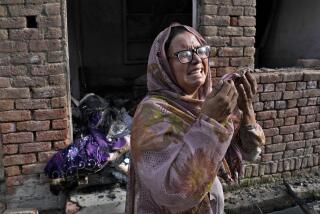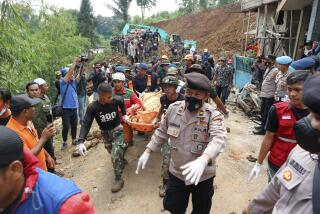320 Die in Week of Clashes, Indonesia Says
- Share via
JAKARTA, Indonesia — In the worst outbreak of religious violence in Indonesia in decades, more than 320 people died this week in clashes between Christians and Muslims in the Spice Islands, officials said Thursday.
Christian leaders renewed calls to the United Nations to send in peacekeepers to prevent a full-scale religious war, expressing fears that security forces will be unable to quell the escalating combat.
Though the archipelago has been plagued by violence in recent months as several provinces of Indonesia seek independence, this week’s carnage is the worst of any religious conflict in the republic’s 54-year history.
The bloody feud bodes ill for efforts by President Abdurrahman Wahid to keep this ethnically and religiously diverse nation of 210 million people from fragmenting.
This week’s death toll is the highest in a year of savage sectarian fighting in the two provinces of North Maluku and Maluku. Before the latest week’s bloodshed, government statistics put the number of deaths sparked by religious clashes there at about 800 for the year.
Clashes in Maluku and North Maluku eased somewhat Thursday, although tensions remained high throughout the provinces.
“The United Nations must intervene to separate and protect the two communities and ensure peace,” said Chris Sahetopy, a Christian provincial assembly member.
The humanitarian group Doctors Without Borders said health conditions were rapidly deteriorating because of the fighting. In a statement released in New York, it said that medical supplies could not be delivered, that people in need of care were trapped in areas controlled by practitioners of the other religion and that health providers were afraid to cross religious lines.
Although 90% of Indonesia’s people are Muslims, Christians are a majority in the Spice Islands.
Military commanders have warned that the opposing factions are arming themselves with assault rifles, and have called for martial law. But Wahid has rejected calls for a state of emergency. He has also ruled out foreign intervention.
More to Read
Sign up for Essential California
The most important California stories and recommendations in your inbox every morning.
You may occasionally receive promotional content from the Los Angeles Times.













